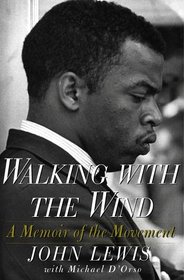A good overview of the civil rights movement by someone who was always in the middle of the non-violence "fight"
Search -
Walking with the Wind: A Memoir of the Movement
Walking with the Wind A Memoir of the Movement
Author:
In Walking with the Wind, John Lewis recounts his life with the fierce simplicity for which he is known, both in public and private. A boy from rural Alabama whose journey led him to Washington, and whose vision and perseverance changed a nation, Lewis tells his story of struggle in the civil rights movement, of com... more »
Author:
In Walking with the Wind, John Lewis recounts his life with the fierce simplicity for which he is known, both in public and private. A boy from rural Alabama whose journey led him to Washington, and whose vision and perseverance changed a nation, Lewis tells his story of struggle in the civil rights movement, of com... more »
ISBN-13: 9780684810652
ISBN-10: 0684810654
Publication Date: 6/22/1998
Pages: 496
Rating: 3
ISBN-10: 0684810654
Publication Date: 6/22/1998
Pages: 496
Rating: 3
4.5 stars, based on 3 ratings
Publisher: Simon & Schuster
Book Type: Hardcover
Other Versions: Paperback
Members Wishing: 7
Reviews: Member | Amazon | Write a Review
Book Type: Hardcover
Other Versions: Paperback
Members Wishing: 7
Reviews: Member | Amazon | Write a Review
Please Log in to Rate these Book Reviews
Genres:
- Biographies & Memoirs >> Community & Culture >> Black & African American
- Biographies & Memoirs >> Community & Culture >> General
- Biographies & Memoirs >> General
- Biographies & Memoirs >> Historical >> United States >> General
- Biographies & Memoirs >> Leaders & Notable People >> Political
- Nonfiction >> Current Events >> Civil Rights & Liberties




